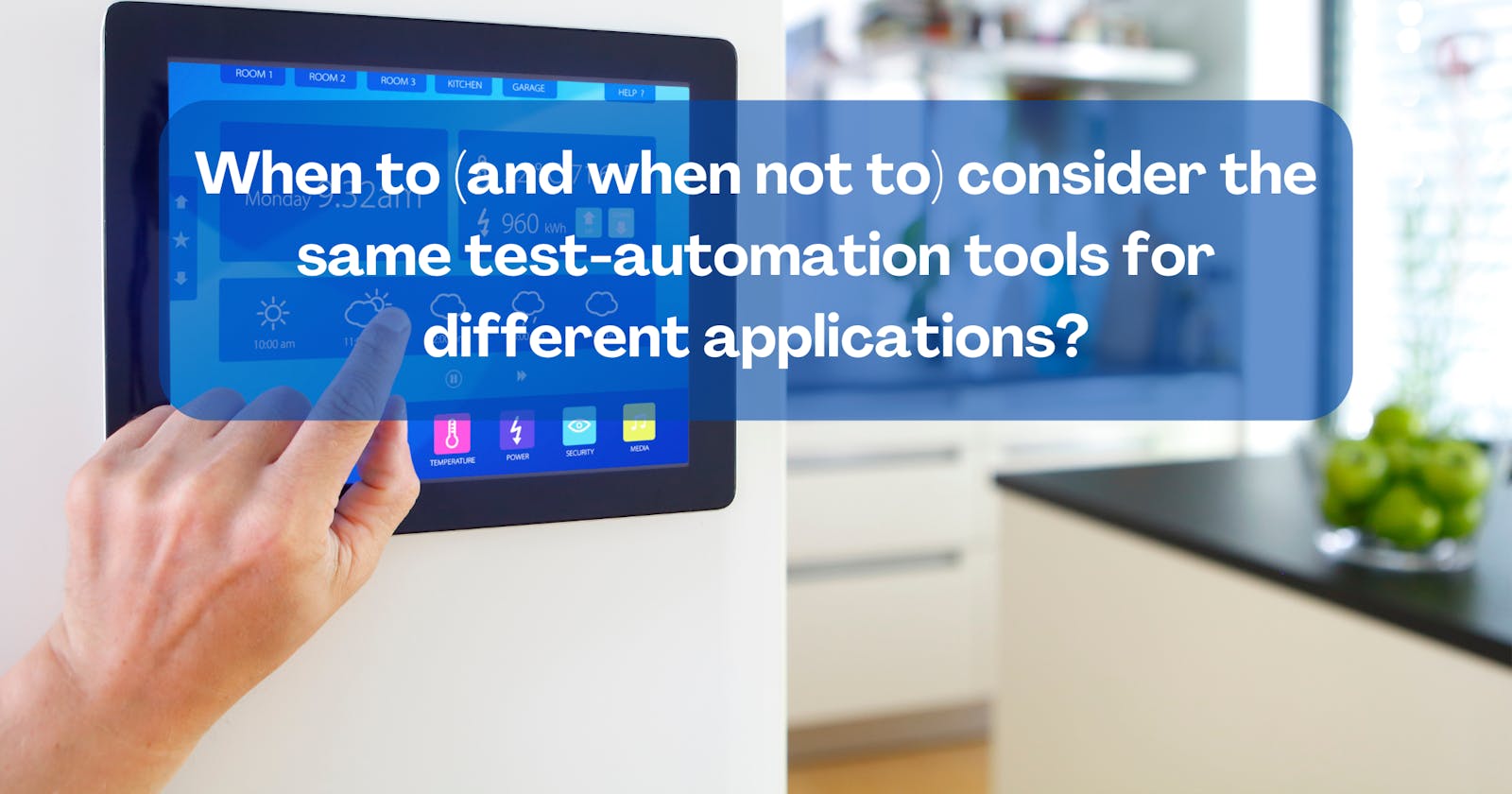When to (and when not to) consider the same test-automation tools for different applications?
Companies develop software products to stay relevant to the trend and offer seamless customer service. To ensure that the quality of the developed product is impressive, it is essential to carry out a strong testing process. Furthermore, with advanced mobile and web technology evolving every day, the need for test automation is constantly growing to deliver flawlessly working software products. Test automation has helped to automate mundane, repetitive tasks and led businesses to improve their ROI metrics.
The success of automation testing depends on the right choice of tools. It is important to evaluate the testing tools in the market as choosing the right test automation tool helps you achieve accurate results for your software testing. Testing software is a time-consuming process but a critical one as it ensures the sustainability of your project in a long run.
Same test automation cannot prove efficient for a diverse application range as they have a different built and working structure. Let us discuss where the same test automation tool can be applied for different applications and where it cannot be.
Criteria for considering test automation tool for an application
Application testing is a software testing process that is performed to find any faults in the software. This is an important procedure in the entire software development process as it reduces cost, maximizes ROI, and saves time and effort. Choosing the right test automation during application development is the most critical step. The selection of automation testing tools depends on multiple criteria as discussed below.
- On a broader scale, application development is differentiated into two extensive networks – core and edge, and between them lies the workflow process. The core system handles the internal transaction processing of the company. They are large, slow to change, more data-oriented, and stable. Whereas edge systems are typically external-facing platforms with relatively lesser functionality but higher diversity of deployed ecosystems. They are smaller, more visual, and prone to rapid changes. Core and edge are designed to perform different tasks; hence, the same test automation tool for testing both application stacks might be sub-optimal.
- Similarly, application development also varies based on the industry. The software that can be used for creating e-commerce and lifestyle apps may not be appropriate for insurance and financial applications. Lifestyle apps are created to support an individual’s needs that define his/ her lifestyle, such as travel, fitness, food, music, etc; whereas finance apps connect with one’s bank account and help him/her track the expense, transfer money, pay bills, etc. With the entirely different utilities, the two different apps offer; the software automation testing tools also vary. The same tool is applicable for similar applications like all lifestyle apps, all financial apps, etc, but using a single automation tool for all the apps may prove inefficient.
- Your needs from a test-automation platform might vary across the SDLC or your product lifecycle. Any product goes through three stages – infancy, growth, and maturity. The infancy stage witnesses rapid development and needs greater speed, while the maturity stage is more optimized and stable. The infancy stage testing is focused on development and speed, but the maturity stage may need to undergo regression from time to time to detect any fault in the previous stage of the development cycle. The automation tool used for the highly dynamic infancy stage of the software cycle may not be efficient for the stable maturity stage and vice-versa.
- The difference also lies in the primary interface being used by the system, like the graphical user interface (GUI) and Application Programming Interface (API) among others. API allows communication between technology products whereas GUI allows users to interact with a computer application. The same testing tool will prove to be inefficient for both applications.
- In addition to these factors, the selection of tools also depends on the life of test automation, whether it is short or long. Here, the same tool cannot be used for processing and reporting, as processing forms a single-step process while the report is a multi-step process.
Multiple application solutions for local systems
Business applications form the backbone of organizations as they are directly linked to business profit. They possess critical importance in the success of a business as they are designed to satisfy the specific needs of a business. Hence, thorough testing of them becomes mandatory. Any fault will lead to poorly working applications and unsatisfied customers, which will eventually affect the brand value.
If a business is planning to implement multiple application testing solutions, it is important to choose a system that is with higher accuracy than AI. The AI-integrated system should be fed with all possible test scenarios for it to learn and execute. The system should have automation capabilities that should evolve and help in future transformation.
Furthermore, there is a 3-way objective to evaluate when trying to install a new system in place.
- Cost of building new test-cases
- Cost of maintaining old cases (updating etc.)
- Cost of manual execution
Here, cost should be measured in terms of $$ and time-to-market / turn-around-time.
Yethi’s multiple-application solution
Yethi is a QA service provider to the banking and financial sectors worldwide. It specializes in all kinds of application testing ranging from core & edge, product lifecycle stages, industry-based application, and interface-based application testing. Yethi’s Tenjin offers testing solutions with cutting-edge technology that can ‘learn’ and ‘re-learn’ with minimal or no manual intervention. This codeless, auto-adaptive, agile test automation is perfect for enterprise application testing and also offers test automation for mobile applications.
Yethi Consulting offers an efficient test automation solution to banks and financial organizations across the world. The focus remains to improve the effectiveness of the organization’s core software system and ensure increased agility, consistency, and accuracy.
